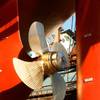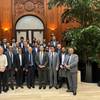LR Joins Collision Avoidance Research for Autonomous Ships
LR is participating in the MAXCMAS project, a £1.27million collaborative research project that aims to investigate, develop and implement real-time collision avoidance algorithms for autonomous maritime vessels. The MAXCMAS (Machine executable collision regulations for Marine Autonomous systems) project will be completed next year; it brings together expertise from LR, Rolls Royce as project lead, Atlas Elektronik UK, Queen’s University Belfast and Southampton Solent University’s Warsash Maritime Academy
The MAXCMAS project aims to develop COLREGs (International Regulations for Preventing Collisions at Sea 1972) compliant collision avoidance navigation for autonomous ships and other Unmanned Surface Vessels (USVs). Compliance with current and future regulations is instrumental to the wide-scale use of USVs at sea. Being able to demonstrate satisfactory autonomous operation that meets the COLREGs is also pivotal to maritime safety.
The project also hopes to carry out comprehensive machine execution of the COLREGs and demonstrate these in part in real-world representative sea trials. With academic support, the industry participants aim to demonstrate autonomous control of a USV for Mine Counter Measure (MCM) operations and develop broader USV applications along with navigational support for larger conventional vessels.
A key innovation will be the use of networked bridge simulators as a safe yet effective test environment in the first instance. These highly immersive simulators, ordinarily used for mariner training, will be used to rapidly iterate development in light of human reaction from the crew and real-world difficulties such as degraded sensors.
Jesus Mediavilla Varas, Strategic Research Lab Lead Specialist and LR’s lead on the project commented: "Lloyd’s Register’s main contribution is a number of safety assurance activities, including providing software assurance advice. The activities are aimed at identifying the challenges and solutions to assuring the safe implementation of the COLREGs principles and reducing the risk of operating autonomous vessels. The maritime industry is moving towards smarter and more autonomous vessels, and involvement in research projects like MAXCMAS allows us to better understand the technological risks and control measures associated with greater autonomy and to be equipped to provide assurance to our clients when the technology is ready."












